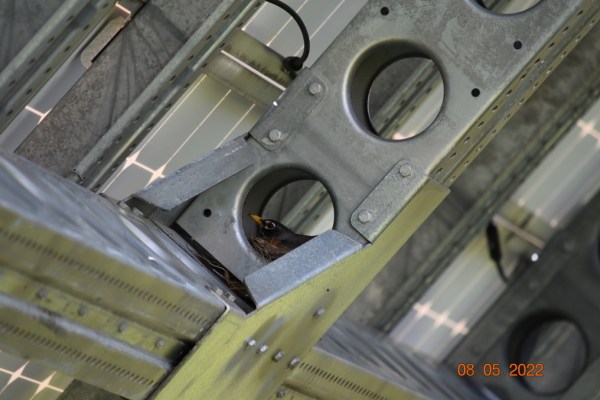
Do you have an outdoors photo or video to share? Send it to [email protected] and tell us, “I consent to the BDN using my photo/video.”
Just when you think you have seen it all, Maine wildlife demonstrates its incredible versatility and adaptability.
In Sidney, a female robin has apparently decided that it’s useless to resist the technology revolution and take advantage of what it has to offer.

Rose Clowes has generously provided Bangor Daily News readers with other interesting wildlife videos and photos, including a female deer asserting its dominance, a spunky red fox hunting for its lunch, and a hungry bobcat chasing a raccoon up a tree.
Today, she was kind enough to share today’s story about the robins nesting in her backyard.
The thing is, the birds aren’t in a nearby tree or even in gutter, eave or a light fixture. Nope, these robins are going high tech.
Clowes said her backyard robins prefer to join the solar revolution.
“I thought I’d pass along a few pics and a video of our resident robins nesting in an unusual place — the back of our solar panel tracker, which is off the ground and pretty much predator proof. Smart birds,” Clowes said.
The robins have for several years built their nest inside a circular opening that is part of the framework that supports the moving solar panels.

“The tracker moves with the sun to maximize energy production, and goes from completely horizontal at night to almost completely vertical during the day,” Clowes said. “We are amazed that both birds and eggs don’t fall out!”
Yes, it appears as though the robins have implemented some engineering know-how of their own, adapting their home to handle the constant shifting of the unit.
“On closer examination, it appears that the nest is built in two parts to accommodate the change in direction,” Clowes said. “You can see how the birds change their position in the photos.”
The robins also take full advantage of other amenities provided as part of their residency, splashing around in the adjacent man-made “pool.”
“The black on the robin’s breast is dirt from the nest, which is washed off in our birdbath about twice daily. Those robins really enjoy their baths,” Clowes said. “It’s fun to watch them power around the perimeter, splashing up a storm.”

Clowes serves as the pool cleaner, changing out the water after the birds are done bathing. She figures, what reason would the robins have not to choose such a complete setup.
“A safe nest, a large lawn with plenty of worms, and a fresh water bath. What more could a robin ask for?” Clowes said.
Thanks again to Rose Clowes for sharing more of her awesome wildlife stories with us!










